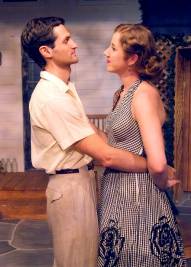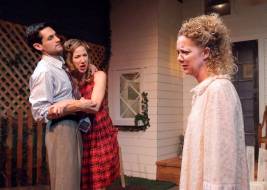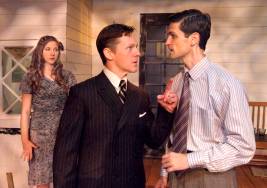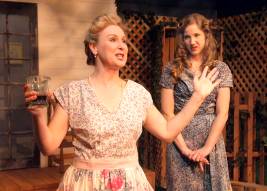
There’s no greater work of 20th Century American theater than Arthur Miller’s now classic All My Sons. Debuting on Broadway less than two years after World War II ended with Japan’s surrender, Miller’s examination of personal responsibility in time of war remains every bit as powerful—and relevant—sixty-three years after its New York premiere.
I don’t know of a local All My Sons production since its big-stage, big-name revival at the Geffen four years ago, so its return to Los Angeles at North Hollywood’s Raven Theatre offers a rare chance to discover Miller’s playwriting genius at its peak. Though the Wasatch Theatrical Ventures staging is marred by one of its lead performances not up to Miller standards, direction by Kiff Scholl and some remarkable acting in other major roles makes this an All My Sons revival well worth seeing.
The 1947 Tony Award winner revolves around a day in the life of the Kellers, a Midwest family who seem from the outside to be living the American Dream. At curtain up, prosperous factory owner Joe Keller (Mark Belnick), his wife Kate (CaroleAnne Johnson), and their adult son Chris (Nicholas S. Williams) are welcoming a visit from grown up next door neighbor Ann Deever (Lauren Dobbins Webb), back in town for the first time since moving to New York several years earlier. Ann and the Kellers’ older son Larry were an item when Larry went off to war, but the elder Keller boy was declared missing in action three years ago, and there has been no word of his fate. Though Kate steadfastly refuses to believe that Larry is dead, Ann apparently feels quite differently about the matter. She and Chris have been corresponding secretly for the past two years, and Ann’s return home signals a change in their relationship. Friendship has turned to long distance love, and Chris is planning to propose to Ann. There’s only one hitch. An engagement between Chris and Ann would mean a tacit acceptance of Larry’s death, and this is something which Kate will never do.
There’s one other stumbling block to the young couple’s potential happiness together. Ann’s father (and Joe’s business partner) Steve was sentenced to prison three years earlier for having knowingly sent out a shipment of defective airplane parts from Joe’s and his factory, cracked cylinder heads which led to the deaths of twenty-one pilots. Joe had initially been found guilty as well, however his insistence that he was home sick in bed the day the order got shipped out, corroborated by Kate, soon relieved him of any responsibility for the plane crashes, and he was subsequently released from prison.
When Ann’s brother George (Dave Kirkpatrick) shows up on the Kellers’ doorstep following a prison visit with his father, the stage is set for a two-family showdown which will forever alter the path of Chris Keller’s life and the lives of those he loves.
All My Sons works brilliantly on many levels—as a story of family, as a love story, as a mystery, and as a discussion starter. Even more than six decades after its premiere, All My Sons’ questions still ring true. Does a person’s responsibility to his family trump his responsibility to his country? Does war bring out the worst in people, or their best? Can a person go on living without self respect or the respect of others?
As its secrets are revealed, All My Sons becomes steadily more engrossing. Expect to gasp. Expect to cry. Expect to be moved profoundly by this truly great work of American theater.
In Joe Keller, Arthur Miller created one of the greatest roles ever written for an over-60 actor, a 20th Century Lear, a role that only an actor of brilliance, a Dustin Hoffman or his L.A. stage counterpart, can possibly bring out to full advantage. Wasatch Theatrical Ventures founding Artistic Director Belnick would have been wise to hold auditions for the role he has chosen to essay here. Although to his credit, Belnick’s performance does improve as Joe’s anger rises, his deadpan line readings do not do the role, or Miller, justice.
Fortunately, Belnick has hired some outstanding actors to surround him, a number of whom have worked with director Scholl at Hollywood’s Theatre Of NOTE.
Williams is absolutely superb as Chris, his performance revealing all the young man’s idealism, his love of family and of Ann, and the loyalty he feels towards his father and towards the soldiers he would willingly have given his life for. When Chris’s idealism turns to disillusionment, the effect is devastating, as Miller intended.
The marvelous Johnson gives us a Kate whose very being is an open wound, so excruciating is the pain tearing at her heart since the report of Larry’s plane’s disappearance. From Webb’s first entrance as Ann, the lovely young actress is perfection, embodying every young man’s girl-next-door ideal and capturing the precise look and sound of the era. Kevin Ashworth and Mary Carrig give excellent support as neighboring couple Dr. Jim and Sue Bayliss. Ashworth is a natural as good-humored Jim and Carrig quite terrific as his steely wife. (The scene in which Sue tells Ann to settle down with Chris … somewhere else … is a particular winner.) Kirkpatrick has many strong moments as George, though he could slow the character’s speech and take his sudden outbursts down a tad. Matt Shea and Joannie Ellen make for an entertaining Frank and Lydia Lubey (another neighbor couple), but their quirky takes on the pair seem out of place next to the more realistic performances of their costars.
Director Scholl does fine work at getting All My Son’s timeless message across, and his decision not to have an intermission between Acts Two and Three is a sound one, maintaining the emotional impact of the Act Two climax that would have been diluted by an interval, or even a brief five-minute pause. (I do hope that in future performances Johnson will say Kate’s final line with the force it deserves. With the words spoken barely above a whisper, the play’s ending loses the hope that I believe Miller intended.)
L.A. theaters have earned deserved praise for downscaling big stage Broadway plays and musicals. Still, the Raven seems a bit cramped for All My Sons, though Davis Campbell’s set does manage quite skillfully to compact the Keller’s house and yard to matchbox dimensions. Matt Richter’s sound and lighting design are first rate, however the volume of one important sound effect ought to be upped significantly for full impact. Sarah Register’s period costumes are mostly very well chosen and era-appropriate, the one exception being Ann’s red-plaid above-the-knee frock that’s neither historically accurate or flattering to Webb. Andrew Thompson is production stage manager.
Ultimately, thanks to solid direction, some sensational performances, and most of all to Arthur Miller’s brilliance as a playwright, this All My Sons leaves its audience moved and shaken as they should be. If you’ve never seen All My Sons, see it now, as who knows when it will be staged once again.
Raven Playhouse at 5233 Lankershim Blvd., North Hollywood.
www.plays411.com/sons
–Steven Stanley
June 6, 2010
Photos: Ed Krieger






 Since 2007, Steven Stanley's StageSceneLA.com has spotlighted the best in Southern California theater via reviews, interviews, and its annual StageSceneLA Scenies.
Since 2007, Steven Stanley's StageSceneLA.com has spotlighted the best in Southern California theater via reviews, interviews, and its annual StageSceneLA Scenies.







 COPYRIGHT 2024 STEVEN STANLEY :: DESIGN BY
COPYRIGHT 2024 STEVEN STANLEY :: DESIGN BY